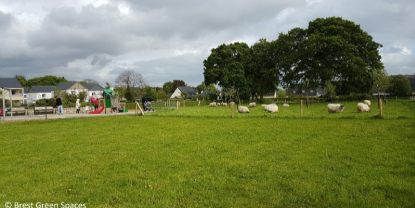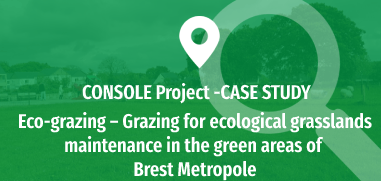Summary
The Head of Green Spaces of Brest Metropole has chosen to entrust the management of the mowing of some of their green spaces to an eco-grazing service proposed by a breeder with a part of his flock of Scottish Black Face-bred sheep whose production (lamb meat) is subsequently sold (not cull or amenity animals as classically done). Eco-grazing is more expensive than conventional mowing, but has been chosen for the many environmental services that result (reducing GHG emissions, reducing noise, social link, local agriculture, invasive plant management, favouring mellow-flowering plants).
Objectives
- Decrease in carbon footprint (from 2 to 8 mower interventions to max passage with a lighter machine)
- Noise reduction
- Social link in neighborhoods
- Meat production from local urban agriculture
- Biodiversity, invasive plants management
- Alternative approach to thermal and chemical tools
Public Goods




Problem description
Brest Metropole used to manage extensive meadows using the mower and other thermal tools. In order to implement greener management of these grasslands, the Head of Green Spaces took the initiative to introduce eco-grazing, which was more expensive than previously done. A breeder responded to the call for tender by proposing to set up eco-grazing as part of his organic lamb production, to ensure the maintenance of meadows and to provide the desired environmental services.
